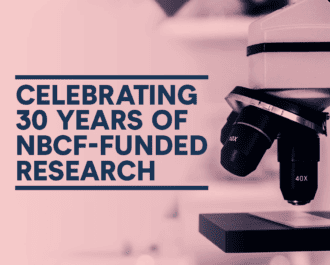 Treat
Treat
Researchers in Britain have shown that cancer cells escape the breast at a late stage of tumour development, rather than during the early stages.
This reinforces the knowledge that detecting, diagnosing and treating breast cancer early is essential to saving lives from breast cancer.
Catching breast cancer at this early stage means the tumour does not have a chance to spread, or metastasise, to other parts of the body such as the lungs, brain and bone.
The five-year survival for breast cancer is 90 per cent and the outlook if the disease is caught early is very good. However, the story is not as positive if a woman develops metastatic breast cancer.
The five-year survival rate for metastatic breast cancer is only 40 per cent and current treatments are not yet overly effective.
This research is important as among the research community there has been debate about whether breast cancer cells that spread to other parts of the body break off and leave the primary tumour in the breast at an early or later stage of cancer development.
What the researchers found
In this study, researchers at the Wellcome Trust Sanger Institute investigated how breast cancer evolves from the original tumour in the breast to tumours that have metastasised.
Researchers found that in the time between breast cancer patients being diagnosed with primary cancer and the diagnosis of metastasis, the breast cancer cells had gained genetic changes, or mutations.
The team found that most of the genetic changes in the original breast tumour were also present in the metastatic tumours. These similarities demonstrated that the cancer cells spread late in disease development.
This underpins the importance of detecting breast cancer as early as possible.
More News Articles
View all News Treat
Treat


